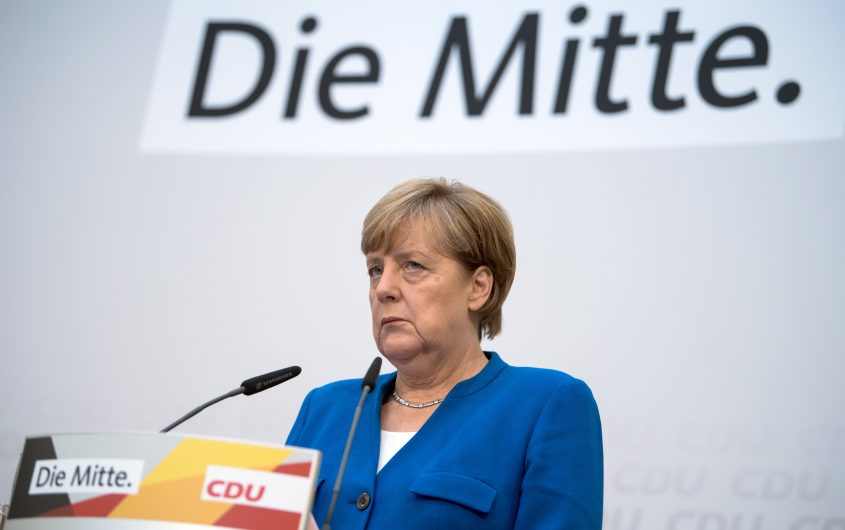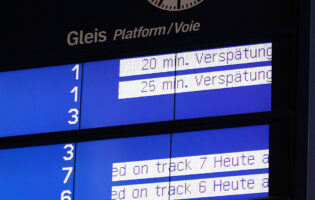
Bernd von Jutrczenka/picture alliance via Getty Images
Maneuvering Around the Middle: Party Politics in 2020

Jackson Janes
President Emeritus of AGI
Jackson Janes is the President Emeritus of the American-German Institute at the Johns Hopkins University in Washington, DC, where he has been affiliated since 1989.
Dr. Janes has been engaged in German-American affairs in numerous capacities over many years. He has studied and taught in German universities in Freiburg, Giessen and Tübingen. He was the Director of the German-American Institute in Tübingen (1977-1980) and then directed the European office of The German Marshall Fund of the United States in Bonn (1980-1985). Before joining AICGS, he served as Director of Program Development at the University Center for International Studies at the University of Pittsburgh (1986-1988). He was also Chair of the German Speaking Areas in Europe Program at the Foreign Service Institute in Washington, DC, from 1999-2000 and is Honorary President of the International Association for the Study of German Politics .
Dr. Janes is a member of the Council on Foreign Relations, the International Institute for Strategic Studies, the Atlantic Council of the United States, and American Purpose. He serves on the advisory boards of the Berlin office of the American Jewish Committee, and the Beirat der Zeitschrift für Außen- und Sicherheitspolitik (ZfAS). He serves on the Selection Committee for the Bundeskanzler Fellowships for the Alexander von Humboldt Foundation.
Dr. Janes has lectured throughout Europe and the United States and has published extensively on issues dealing with Germany, German-American relations, and transatlantic affairs. In addition to regular commentary given to European and American news radio, he has appeared on CBS, CNN, C-SPAN, PBS, CBC, and is a frequent commentator on German television. Dr. Janes is listed in Who’s Who in America and Who’s Who in Education.
In 2005, Dr. Janes was awarded the Officer’s Cross of the Order of Merit of the Federal Republic of Germany, Germany’s highest civilian award.
Education:
Ph.D., International Relations, Claremont Graduate School, Claremont, California
M.A., Divinity School, University of Chicago
B.A., Sociology, Colgate University
Expertise:
Transatlantic relations, German-American relations, domestic German politics, German-EU relations, transatlantic affairs.
__
In the last two weeks, four political parties in Germany have gathered at their annual conferences to start positioning themselves for the next federal election, currently scheduled for 2021. In Germany’s constitutional framework, Article 21 of the Basic Law says, “The political parties participate in the forming of the political will of the people.” The question is: what will be the form and direction of that political will as Germans enter the 30th anniversary year of unification and begin their long farewell to Angela Merkel. Predictions are hard to make.
The years beyond 2020 will also be an opportunity to test the strength of the bonds between the parties today and the will of an electorate that is larger, more diverse, and less cohesive than in the past, perhaps less sure of what it confronts and what it wants from new leaders who seek their votes.
The Greens had their party convention in mid-November, which strongly solidified their leadership and their agenda. The near-unanimous vote to reelect their dual leadership of Annalena Baerbock and Robert Habeck was accompanied by emphasis on ambitious environmental policies as well as economic reforms such as higher minimum wage demands and federal spending increases. Riding on a wave of popular opinion polls reaching over 20 percent, the goal is to be back in government as a part of a coalition in Berlin after the next election. For a party renowned for its internal arguments, this demonstration of consensus is an unusual moment and reflects both the ambition and the expectation that the Greens have options to consider in a governing coalition in Berlin as long as they maintain the momentum throughout the coming year and into 2021. The Greens have frequently experienced a surge in polling in recent years, which does not always translate into voter behavior on election day. But they may be headed toward better results given the rise in profile of environmental issues (Fridays for Future) as well as the decline of support for the Social Democrats.
The CDU had their party convention in Leipzig amid expectations that there might be a challenge to the current party chair, Annegret Kramp-Karrenbauer. However, the delegates issued a strong signal of support for her—for now. Her continued lackluster poll ratings leave some still wondering whether she can improve over the coming year and fend off any further questions about the aspirations she has to win the nomination as chancellor candidate for the CDU in 2021. As Minister of Defense she carries a heavy load of dealing with the need to defend Germany’s defense budget and demands to strengthen the German armed forces over the next year. That Ministry continues to be a dangerous one as it has been for others in the past. Only one survived to become chancellor (Helmut Schmidt) but for the moment, her position as head of the party is secured. Potential rivals for AKK remain in circulation, but for now that issue is postponed until next November, assuming there are no early elections.
A few days after the CDU event, the members of the SPD elected its new party leadership in Berlin with a surprise result. Beating out the expected winner, finance minister Olaf Scholz and his running mate, the dual winners—Norbert Walter-Borjans and Saskia Esken—were relatively unknown figures in the party. Running on a campaign that calls the current coalition with the CDU-CSU into question, the winners leave open whether there might be early elections in 2020 should the upcoming SPD party convention vote to exit the troubled partnership with the CDU. Given the steep decline the SPD has suffered in multiple elections and opinion polls over the past year, the call to end the coalition has been growing louder in the party base. The victory of Walter-Borjans and Esken was a protest vote against Scholz and those who represented the platform of continuing the coalition with the CDU/CSU. In many ways it was a populist vote against the SPD elite leadership. But it was a relatively thin margin of victory which now needs to be confirmed at the party convention. The debate over continuing the coalition through the remaining period until the fall of 2021 is not over. While those arguing that the benefits for the SPD if they do exit the coalition are to redefine the party’s mission and message, those arguing against it draw on the fact that the party would lose all their government ministerial positions in the cabinet. That would leave Chancellor Merkel able to run a minority government with an all CDU/CSU cabinet. The remaining option—to force a vote in the parliament to pull the plug on Merkel—could lead to new elections in 2020, but the public response to that action might backfire on the SPD, especially since they have no candidate to put forward to compete with a still-popular Angela Merkel.
Meanwhile the Alternative for Germany (AfD) was meeting in Bielefeld to confirm its leadership as well as the platform that has helped the party have its best election results to-date in three consecutive regional elections in the past three months. The confirmation of Jörg Meuthen and the election of Tino Chrupalla as dual chairmen of the party combines the alleged efforts to reach a larger proportion of the middle-class voters. However, Chrupalla has also stated that he represents all of the AfD “wings,” which include figures like Björn Höcke. Chrupalla replaced Alexander Gauland in a sign that the party is maintaining its far-right platform of anti-immigrant slogans and nationalist messages. With strong support in the eastern states, the goal is to expand that outreach. It is clear that the means toward that end will be the same they used in Saxony, Thuringia, and Brandenburg, where the AfD picked up a quarter of the votes. Whether that can boost their results nationally is unclear.
Each of these events represented a mix of party posturing and positioning with an eye on anticipating where their support may come from whenever the next elections occur. But the larger symbolism is the changing parameters of politics emerging in Germany and indeed throughout Europe. Whether measured by party membership rising or declining, increasing numbers of swing voters, opinion polls, or the results of party conventions, the connection between parties and the political will of the voters is increasingly uncertain. Which groups the parties think they represent may be less reliable in an environment in which polarization and personalities tend to dominate debates. Evidence for that is ample in the United Kingdom and the United States as both confront upcoming elections.
Whether measured by party membership rising or declining, increasing numbers of swing voters, opinion polls, or the results of party conventions, the connection between parties and the political will of the voters is increasingly uncertain.
The parliamentary system in Germany has been capable of absorbing a broad range of political interests representing multiple parties over the past seven decades without losing a firm hold on the center of the political mainstream. It welcomed new parties along the way and saw older parties adjust to new challenges. The ability to have guard rails against extremist groups entering the political arena was embodied in the laws preventing a party with less than 5 percent of the national vote from entering the Bundestag or regional governments. That system has also contributed to electing eight chancellors in the past seven decades, two of which have governed the country for half of that period. Germans have largely been inclined toward stability—not risky unpredictability.
As W.B. Yeats would ask, Can that center still hold? Can the falcon not hear the falconer? It depends on where the center of a changing society is to be found. The coming year will be an opportunity to mark a milestone of unification. But how unified is Germany politically? The years beyond 2020 will also be an opportunity to test the strength of the bonds between the parties today and the will of an electorate that is larger, more diverse, and less cohesive than in the past, perhaps less sure of what it confronts and what it wants from new leaders who seek their votes. The long run of Angela Merkel as chancellor may be almost over. But the “turning and turning” Yeats cited is impacting German society and its political parties, and may shorten the tenure of future chancellors and their governments. Like it or not, Germany may be confronting more unpredictability.









